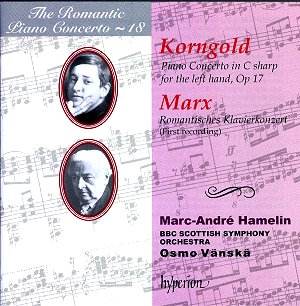Hyperion are to be congratulated on another fine release
in their Romantic Piano Concerto series not the least for the ‘discovery’
of Austrian composer Joseph Marx. This is not the first time that any
of his music has been recorded but certainly previous releases (on Solstice
FY and Etcetera) have been restricted to chamber music and Lieder. On
the evidence of this lovely piano concerto, this neglect is to be regretted.
Marx composed a considerable amount of music: many piano works, chamber
music, over 200 exquisite songs, large-scale choral works and a symphonic
poem. None seem to have been performed over the last fifty years. Marx
was influenced by Brahms, Schumann and Max Reger and his style is thought
to bridge those of Brahms, Wolf and Schoenberg.
An opening bravura orchestral tutti ushers in the piano
in cadenza-style. The language is Romantic and Brahmsian. Woodwinds
deepen the colour of the theme. The piano writing is heavily accentuated
with powerful octaves over a fulsome orchestral backing. A slower and
very expressive theme full of rich harmonies contrasts and there is
a brief scherzo-like section in 6/8 time leads to several climaxes when
the BBC SO under Osma Vänskä display splendid virtuosity.
The slow movement begins in calm pastoral mood with
the piano contributing an appealing plaintive melody that builds to
a crescendo with spread chords and chromatic arpeggios - in mood not
unlike the cinematic Korngold. The piano distances itself in elegiac
mood for a while before the orchestra joins in for the final chords.
The final movement commences in a jolly robust mood
with dance rhythms and playful material woven into a musical tapestry,
glittering and colourful. In the coda, Marc-André Hamelin demonstrates
his musicianship in full, brilliant management of the challenges of
the score; listen for them – double, consecutive chromatic and split-octaves
and syncopated spread chords. Then there is the triumphant orchestral
finale.
Please, Hyperion, let’s hear more Marx!
Much better known for his film music, Korngold wrote
his concerto for the left hand around 1922-23 for Paul Wittgenstein
who had lost his right arm in the Great War. It was first performed
in Vienna, in September 1924, by Wittgenstein who owned the performing
rights so that it was not played by any other pianists until after his
death in 1961. It was then resurrected by the American pianist Gary
Graffman. The concerto is reminiscent of the music Korngold was to write
for the film Of Human Bondage. The work was written for performance
in one continuous movement using a full orchestra. Confusingly, the
concerto’s opening phrase is in C major which leads to a tremendous
C sharp minor chord. The adventurous music threads its way through several
key changes with the melody rising and falling dramatically, then in
contrasting romantic warmth, continually teasing the ear. Luxurious
and scherzo-like material contrasts with more sober utterances. Music
for the trombone features strongly. The piano echoes the sombre mood
with strange dissonant chords followed by spread chords in differing
keys. Harp, violas, and flutes add colour. A strange waltz is countered
by wistful flutes. A solo horn sounds menacingly. Skittish, witty devilish
material passes. Bombast and harsh dissonances are balanced by passages
of lyrical beauty. There is seemingly no end to Korngold’s clever harmonies
and orchestrations.
Exciting compositions sumptuously played by Hamelin
and the BBC Scottish Orchestra. The Marx work is a real find and the
recording companies should explore his music further.
Grace Lace
See also review
by Rob Barnett
Complete
Hyperion Romantic Piano Concert series


